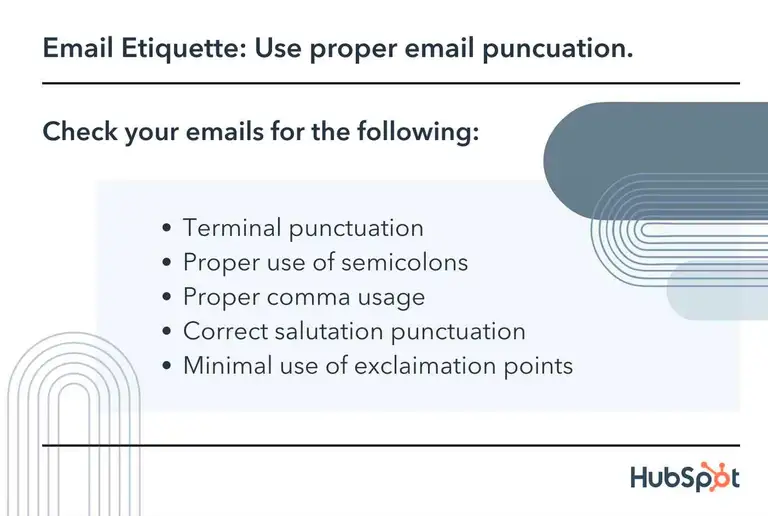Email has been around for a few decades and despite the new trends and social media networks, it's still one of the most effective channels for acquiring new customers. Professional emails can get your email recipients to click through and convert.
But to succeed in this marketing method, you need to cover the basics. And that means knowing the proper email etiquette. Just sending out promotional materials to an email address is not enough to build a relationship.
Here are some email etiquette tips that are going to make your recipients fall in love with your marketing messages.
What is email etiquette?
This refers to the set of rules that should be followed when sending or receiving emails. These rules can vary depending on the situation, but some common examples include using a clear and concise, informative subject line, avoiding the use of all caps or excessive exclamation points, and refraining from sending attachments without prior warning.
Following proper email etiquette in the workplace can help ensure that your messages are received and interpreted in the way you intended, from the subject lines to the professional email signature.
It can also help foster positive relationships with those you communicate with via email, as well as prevent miscommunications that could otherwise occur.
In the real world, you can follow the basic rules of etiquette by monitoring facial expressions, body language and tone of voice. In email, you need to maintain a professional setting and follow the best practices for email etiquette.

Why is email etiquette important?
Email etiquette is important for several reasons.
It can help maintain good communication between people. By communicating effectively via email, people can save time and energy in other forms of communication.
Email can be a valuable way to keep track of important information. If people are able to keep track of important information through email, they will feel more comfortable working with email.
For example, sharing useful business travel information via email can be fast and accurate with the right travel management tools.
It can be a way to share information with others. By sharing information through email, people can help build relationships and collaboration.
Email can be a way to get feedback from others, such as customers or business partners. This will help people improve the quality of their work.
13 email etiquette rules for the workplace
When emailing clients or colleagues, it's important to remember the basics of business email etiquette. Follow these simple rules to make your communication more effective and professional.
Always follow the "to," "from," and "subject" fields
Make sure to enter the correct email addresses in the "to," "from," and "subject" fields of your messages.
This will help you track who has received your email and ensure that messages are properly attributed. This will also help you keep your emails professional and to the point. It is also a good way to avoid any misunderstandings or miscommunications with your colleagues.
Your recipients will know exactly who is behind the email address.
Use proper grammar
It's important to use proper grammar and punctuation in your emails. Incorrect grammar can distract your readers and make your email look unprofessional. On the other hand, using proper grammar shows that you are professional and that you care about your work. It also sets a good example for others to follow.

While your customers are not judging your language skills, grammatical errors and spelling mistakes just give away a bad impression in business communication.
Avoid spamming
Not only is this a time-waster for the recipients, it can also clog up the email system and make it difficult for people to find the messages they need to see.
If you need to include a large group of people in an email, use the BCC (blind carbon copy) function to blind copy them so they don't all have to see the email addresses of everyone else on the list.
And if you're not sure whether someone needs to see an email, err on the side of caution and don't include them. A little courtesy goes a long way in maintaining email etiquette at work.
Use plain language
The way you communicate in email can have a big impact on your career. That's why it's important to use plain language when sending emails at work.
Plain language is clear and concise, and it can help you avoid misunderstandings and miscommunication. It can also make you seem more professional and competent.
So next time you sit down to compose an email at work, take a few minutes to think about your language choices. It could make a big difference in your career.
Avoid typos
When emailing at work, it's important to avoid typos as a way of showing consideration for your colleagues. By spelling things correctly and using proper grammar, you'll be less likely to create confusion or offense. For example, typos in employee time-tracking data can create confusion in the dispatched emails.
Here are a few tips to help you get started with proper spelling:
- Always proofread your email before you hit "send." This will help you catch any mistakes before they become issues with your potential customers.
- Use correct capitalization and punctuation. These are keys to making your email appear professional. Punctuation errors are easy to spot with tools such as Grammarly.
- Avoid using contractions in your text. They can come across as informal and unwelcoming.
- Use common terms and phrases when referring to colleagues and departments. This will help avoid confusion and make your email more readable.
- When emailing with attachments, be sure to include a header that lists the file name, size, and the time it was last modified. This will help others to more easily identify and manage the file.
Stick to the basics
When you email someone at work, it's important to keep your message concise. Try to stick to one or two main points, and avoid getting too verbose. This will make your email easier to read and, consequently, more effective.
Just take a look at the most basic email templates - they have emails that take just a few minutes to go through. It's not a matter of common courtesy, it's basic email etiquette because your email is competing with hundreds of others in someone's inbox.
If you mention email attachments, make sure to include them. Forggeting an attachment can make any formal business email fail.
Don't gossip
When you email someone at work, it's important to be respectful. Don't gossip about the person or the company, and don't include personal information. This will help maintain a professional environment and protect your confidential information.
Whether it's an internal email, a personal email, or one to your customers, stick to professional topics. Talk behind someone's back and it's only a matter of time before the entire team finds out. No matter your job title, gossiping means breaking the basic email etiquette rules.
Keep your message polite
When you email someone at work, it's important to be polite. Be respectful of their time, and don't use inflammatory language. This will help maintain good relations with your colleagues and maintain a positive workplace culture.
You can use emojis in emails, but make sure you don't go overboard. A formal business email can include an emoji here and there but if you use too many, you risk looking spammy in your recipient's email inbox.
Even with a professional email address, using too many emojis will result in informal email content.
Stick to the agenda
When you email someone at work, it's important to be aware of the agenda. Make sure that your message fits within the context of the conversation, and don't engage in discussions that aren't relevant to your email. This will help maintain a positive working atmosphere and keep everyone on track.
You can refer to the previous email, but only if you've sent it recently and the message is fresh in the recipient's mind. The most effective emails are not isolated messages. Rather, think of them as email conversations.
Use active voice
When writing emails, use active language rather than passive language. This will make your messages more engaging and easy to read. Casual language is active and in general, writing in this voice will make it sound like you're talking to a real person.
Set the correct tone for your email and avoid passive voice at all costs. Passive voice will make even an informal email sound overly serious.
Use urgency sparingly
While it may be tempting to hit the "send" button as soon as you've written your message, it's important to take a step back and consider whether or not it truly warrants an immediate response. More often than not, it's best to err on the side of caution and give the recipient a chance to respond at their own pace.
One of the rules of email etiquette is not to use tricks. Also, your customers probably receive hundreds of emails with limited time offers, so try and be creative to stand out.
Follow the company's email policy
If your company has specific email etiquette examples, be sure to follow them. This will help you stay compliant with your company's policies and look professional in the eyes of your clients and colleagues.
While your email software can be set up to follow some basic guidelines, it's still up to you to ensure that every single email aligns with your company policy.
Add an email signature
A professional signature is a great way to end an email thread and let the person know who is talking to them. It's become a common part of email communication because the sender's name and credentials can get lost in email threads.
An email signature is another way to get more out of your email message by adding links to your website, LinkedIn, relevant landing page, or anything else you missed in the email body. Add your job title too to stand out in your recipient's email inbox.
Wrapping up
Following the basic email etiquette rules is not only a great practice to set a professional tone for communication with your audience. It's also a superb way to get a better email marketing ROI from your email lists.





